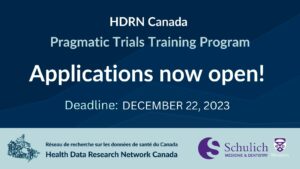Invitation to participate in a study to help identify research priorities for people with kidney failure after surgery
You are invited to participate in a study to identify research priorities for people with kidney failure having surgery, approved by the University of Calgary Health Research Ethics Board (REB23-0749, Principal Investigator Dr Tyrone Harrison) “Identification and Prioritization of Postoperative Outcomes in Research with Multidisciplinary Stakeholders and People Living with Kidney Failure”.
People with kidney failure have over 16 times more surgeries than the general population. Unfortunately, guideline recommended strategies to risk stratify surgical patients are not informed by patient priorities and perform poorly for people with kidney failure, making it difficult for clinicians to engage with patients in shared surgical decision making.
In this study, we want to engage with patients, caregivers, researchers, and healthcare providers to identify and prioritize which postoperative outcomes are important to research in this patient group, and to identify targets for future risk prediction models.
Your involvement in the study will involve the completion of approximately three or four 10-minute surveys as part of a Delphi process.
If you are interested in participating, please click this link https://survey.ucalgary.ca/jfe/form/SV_9mZmv4Ffety6LxY and we will be in contact with further information and an electronic consent process.
Par la présente, nous vous invitons à participer à une étude qui vise à établir les priorités de recherche pour les personnes atteintes d’insuffisance rénale qui subissent une intervention chirurgicale. Cette étude, intitulée Détermination et hiérarchisation des résultats postopératoires dans la recherche en collaboration avec des intervenants multidisciplinaires et des personnes vivant avec une insuffisance rénale, a été approuvée par le comité d’éthique de la recherche en santé de l’Université de Calgary (REB23-0749, investigateur principal : Dr Tyrone Harrison).
Les personnes atteintes d’insuffisance rénale subissent au moins 16 fois plus d’interventions chirurgicales que la population générale. Malheureusement, les stratégies recommandées par les lignes directrices pour stratifier les risques des patients qui subissent une intervention chirurgicale ne tiennent pas compte des priorités de ces derniers et sont peu efficaces dans le cas des personnes souffrant d’insuffisance rénale. Il est donc difficile pour les cliniciens de participer à une prise de décision partagée en matière de chirurgie avec les patients.
Dans le cadre de cette étude, nous souhaitons collaborer avec des patients, des aidants, des chercheurs et des professionnels de la santé afin de déterminer et de hiérarchiser les résultats postopératoires qui sont importants pour la recherche dans ce groupe de patients, et de définir des cibles pour de futurs modèles de prédiction du risque.
Votre participation à cette étude consistera à répondre à trois ou quatre sondages d’une durée de 10 minutes chacun réalisés au moyen de la méthode Delphi.
Si vous souhaitez participer à cette étude, veuillez cliquer sur ce lien https://survey.ucalgary.ca/jfe/form/SV_eLQtzzSMuPxIc5g. Nous communiquerons avec vous pour vous fournir plus de renseignements et vous indiquer la marche à suivre pour obtenir votre consentement par voie électronique.




